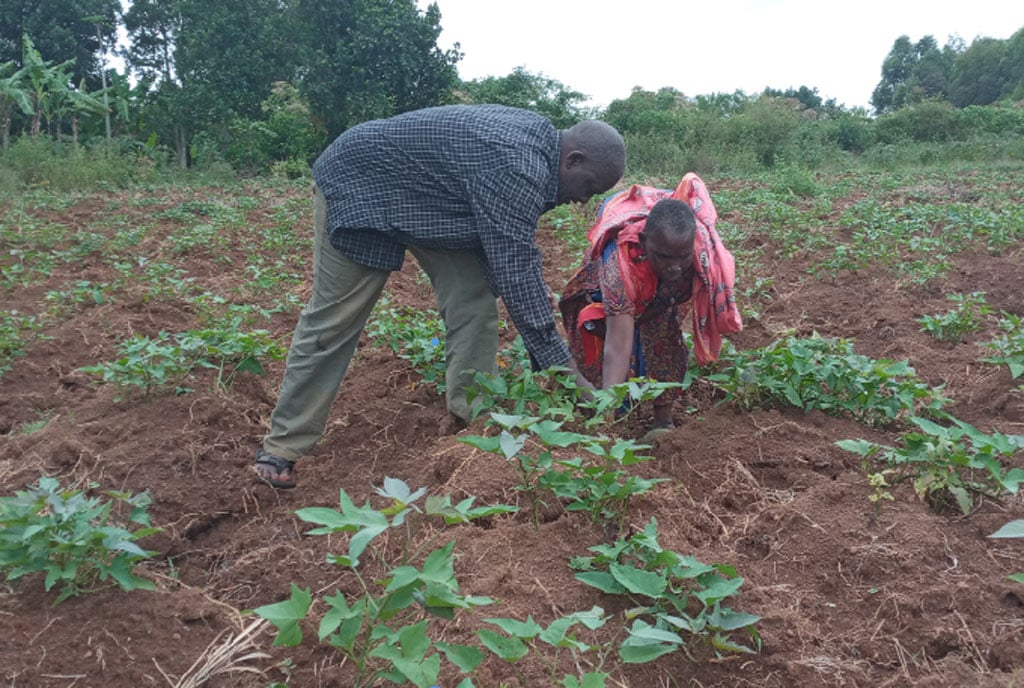Prime
New technology gives farmers hope

Farmers explain how they use the biochar to fertiliser their sweet potato garden. PHOTO/LOMINDA AFEDRARU
What you need to know:
- Seeds of Gold caught up with soil experts and farmers facing soil infertility challenges and below are the details.
One of the most significant bottlenecks to increased agricultural productivity in the country is continuous soil degradation arising from lack of farmers to manage their soil well.
Experts attribute this to climate change risks such as erratic rainfalls, floods and fluctuating temperatures causing soils to lose their nutrients through soil erosion and leaching.
They believe human activities have destabilised the distribution of carbon in the universe because what has been released in the atmosphere is too much than what plants can utilize via the photosynthesis process.
This therefore calls on all land users including farmers to invest heavily in sustainable soil management practices if food production and productivity is to be guaranteed.
Background
Soil scientists note that productivity management practices were part of traditions in many areas of Uganda and these helped to sustain agricultural production.
There is evidence that trash lines were traditionally used on sloping lands in southwest Ugandan to improve soil fertility, water retention and crop productivity.
Other practices that have been used include stone lines across a field for soil and water conservation, use of livestock manures and household waste and shifting cultivation where the overused piece of land was rested to improve soil productivity.
Many of these practices are still being used by fanners except shifting cultivation which has virtually disappeared partly due to land shortage.
As a result early research in Uganda concentrated on introducing exportable crops.
However, it was soon realised that crop yields and soil productivity declined rapidly during continuous cultivation.
Quick fix measures included use of lime since soils were generally acidic and use of fertilisers.
But these measures on already degraded soils failed to adequately improve productivity. It was then realised that proper soils research was essential to understand how tropical soils behave under continuous cultivation.
Seeds of Gold caught up with soil experts and farmers facing soil infertility challenges and below are the details.
Soil infertility
The head of the soils, environment and agrometeorogy unit at the National Agricultural Research Laboratories (NaRL) Kawanda Dr Cranmer Kayuki Kaizzi explaining the soil fertility challenge in the country notes that soils in central Uganda and some parts of eastern Uganda such as Pallisa are no longer fertile.
To him good soil features depend on the nutrient, organisms such as earthworms and rodents such as rats and lastly the softness of the soil texture.
Keeping the soils fertile
According to Dr Kaizzi, there are traditional methods farmers can apply to maintain the soil nutrients and they include allowing the soil to fallow.
Farmers are advised to use the land for six years to plant crops and leave it to fallow for three years. This is because as farmers keep planting, the plants consumed soil nutrients in order to grow well and farmers must keep adding manure to keep the soil fertile.
They can apply both organic and inorganic fertilisers as recommended by the experts when preparing the land for planting as well as control soil erosion through terracing of the land.
He advises farmers to start applying manure and fertilisers when the soil is still fertile because this will increase the soil nutrient.
Modern technology application
A number of farmers especially those in Mpigi District are adopting a modern technology called biochar, David Nkwanga the director Nature Palace Foundation in Mpigi notes that soil degradation can arise as a result of human activities in destroying the environment and continuous tilling.
Therefore his team worked jointly with a student from Makerere University and established a demonstration garden where farmers were sensitised on application of biochar technology to boost the soil nutrient.
What is biochar?
It is carbonaceous solid material produced when biomass is heated in a zero or low oxygen environment.
In Uganda biochar was initially used for making smoke less briquettes for charcoal stoves.
The student and the farmers produced biochar from crop residues especially maize and rice straw.
Once the material has been charred into charcoal like material, it must be crashed into particles and spread in the soil.
A farmer may apply it once in three planting seasons and four bags can be used in one acre.
It allows water retention in the soil thereby enhancing plant growth which absorbs more carbon dioxide from the atmosphere.
Soil testing
Dr Kaizzi explained that if it is possible farmers who can afford to pay Shs50,000 can bring their soil samples to be tested at the Laboratory in NaRL to ascertain the soil fertility.
At laboratory, the technicians receive the soil brought for testing by registering it the book and they marked for identity purposes.
They are then dried at and tested against specific crops which would have been dried at 60degrees Celsius.
The dried soil will be mixed in a solution and tested to read the potassium and sodium level and results will be released accordingly including the soil PH.
Testimony
Harriet Namagembe is mixed farmer growing vegetables, East African Highland banana (Matoke), beans and sweet potatoes among others in Kasange Town Council in Mpigi District.
Namagembe and the rest of the farmers in her village having adopted use of biochar technology are able to get good yields. In her case she is able to harvest vegetables such as cabbages and nakati all year round because the technology allows the soil to retain water at all times.




